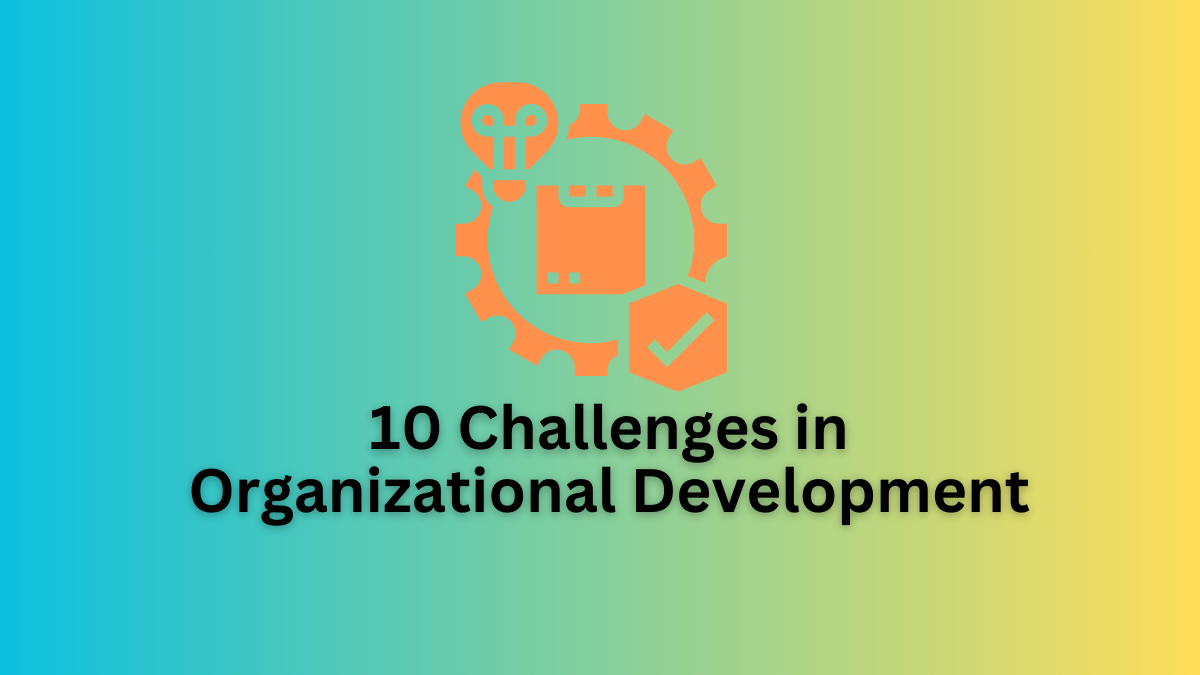Challenges in Organizational Development
Organizational development (OD) encompasses various processes aimed at improving organizational effectiveness and fostering positive change. However, navigating the complexities of OD comes with its own set of challenges.
In this article, we will explore 10 common challenges in organizational development and strategies to overcome those challenges. So let’s get started:
Resistance to Change
Resistance to change is a universal challenge in OD initiatives. Employees may resist new processes, technologies, or organizational structures due to fear of the unknown or concerns about job security.
To overcome resistance, organizations should prioritize effective communication, involve employees in the change process, and provide adequate support and training.
Lack of Leadership Buy-In
Without strong support from leadership, OD initiatives are likely to falter. Leaders play a crucial role in driving change and setting the tone for organizational culture.
To secure leadership buy-in, OD practitioners should align initiatives with strategic goals, demonstrate the potential benefits, and actively engage leaders in the planning and implementation process.
Silo Mentality
Organizational silos can hinder collaboration, communication, and innovation. To break down silos, organizations should foster a culture of transparency, promote cross-functional teamwork, and establish clear channels for information sharing. Encouraging open dialogue and recognizing cross-departmental achievements can also help mitigate a silo mentality.
Limited Resources
Budget constraints and competing priorities often pose challenges for OD initiatives. To maximize resources, organizations should prioritize initiatives with the highest potential for impact, seek external funding or partnerships where possible, and leverage technology to streamline processes and reduce costs. Additionally, investing in employee development can yield long-term benefits for organizational growth.
Read More: 10 Challenges in Controlling
Cultural Resistance
Organizational culture plays a significant role in shaping behavior and attitudes toward change. Cultural resistance may arise from deeply ingrained norms, values, or traditions that conflict with proposed changes. To address cultural resistance, organizations should assess cultural dynamics, identify areas for alignment or evolution, and cultivate a shared vision that resonates with employees across all levels.
Lack of Clarity and Communication
Unclear objectives and ineffective communication can derail OD initiatives and lead to confusion among stakeholders. To enhance clarity and communication, organizations should articulate clear goals, roles, and expectations, provide regular updates on progress and milestones, and solicit feedback from employees to ensure alignment and understanding.
Read More: 10 Challenges in Management Information Systems
Employee Engagement and Motivation
Low levels of employee engagement and motivation can undermine the success of OD efforts. To boost engagement, organizations should foster a supportive work environment, recognize and reward employee contributions, and provide opportunities for professional growth and development. Empowering employees to participate in decision-making and problem-solving can also enhance motivation and commitment.
Change Fatigue
Frequent organizational changes can lead to change fatigue, causing employees to become disengaged or resistant to new initiatives.
To prevent change fatigue, organizations should carefully sequence and prioritize change initiatives, provide sufficient time for adjustment and consolidation between changes, and communicate transparently about the rationale and expected outcomes of each change.
Read More: 10 Challenges in Quality Management
Resistance from Middle Management
Middle managers often serve as gatekeepers between senior leadership and front-line employees, making their support crucial for successful OD initiatives.
To address resistance from middle management, organizations should involve managers in the planning and decision-making process, provide training and support to enhance their change management capabilities and align incentives to encourage cooperation and alignment with organizational goals.
Measurement and Evaluation
Measuring the impact of OD initiatives can be challenging, yet essential for assessing effectiveness and identifying areas for improvement.
To overcome measurement challenges, organizations should establish clear metrics and key performance indicators (KPIs) aligned with strategic objectives, leverage data analytics and feedback mechanisms to track progress, and regularly evaluate and adjust interventions based on results.
Hence, these are the 10 challenges in organizational development and strategies to overcome them.
